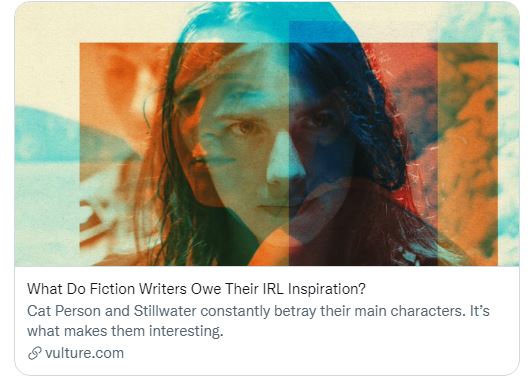
It's unendingly strange to see my face being used yet again, without my consent, to promote products that defame me, this time an essay by @alicebolin for @vulture. 

I'll let the comments to this essay speak for themselves about the argument @alicebolin makes, comparing my recent thoughts on #Stillwater to the #CatPerson controversy.
"Imagine a movie 'inspired by' the Central Park 5 in which it turns out their fictionalized avatars were actually indirectly involved in the rape," this commenter writes. "Would that be justifiable, for fiction's sake?" 

"Sure seems like the author holds the kinds of mistaken beliefs about her that Knox fears still color public opinion of her," another commenter writes. 

That does seem to be the case. @alicebolin paints me as a white woman who falsely accused a man of color, and suggests that my acquittal was not about the utter lack of evidence but politics between the US and Italy. 

@alicebolin, I'd like to tell you about that interrogation, which you reduced to "a white woman falsely accusing a black man."
Many people assume the worst experience of those 8 years must have been the moment that first guilty verdict was handed down. It wasn't. The most terrifying moment for me was that initial interrogation.
While the real killer, Rudy Guede, fled the country, while my Mom urged me to go to the embassy or to my relatives in Germany, I stayed to help the police. They told me I was an important witness.
I was 20 years old, 3000 miles from home, my friend had just been murdered, the killer was on the loose, and I had no one near to protect me. I trusted the Perugian authorities to keep me safe.
Over the course of 5 days, they questioned me for 53 hours without a lawyer, in a language I understood barely at all. That final night, they berated me, slapped me. My mom tried calling me repeatedly and they wouldn't let me answer.
They knew she had just arrived in Rome and was coming to help me, so they decided to break me. For 5 days, I had been telling them everything I knew, which was nothing. That was unacceptable to them.
They told me I must have amnesia, that I must have seen something so traumatizing that I couldn't remember it. They told me that they needed me to remember.
I couldn't understand why they wouldn't believe me. They found a text message on my phone I'd sent to my boss, Patrick, the night before the murder. He'd given me the night off.
I'd tried to tell him, "See you later." I naively translated that American English idiom as "Ci vediamo piu tardi." To Italians, apparently, that was not a nebulous 'see you sometime in the future," but rather a specific plan to see Patrick later that night.
Because of this miscommunication, the police insisted that I met up with Patrick, insinuating his guilt. I told them "no" countless times. They refused my answer. And after hours of sleep deprivation and gaslighting by authority figures I trusted, I started to believe them.
They were telling me I had amnesia. That I was traumatized. Could it be true? Why would they lie to me? Eventually, they typed up a statement and told me to sign it.
It is a confused statement that places Patrick at the house that night, and me nearby as a witness to him being there. It's confused because it was authored by the police out of jumbled imaginings they prompted me to make, and not based in any evidence.
I immediately recanted the statement once I was out of the pressure cooker of the interrogation room. They didn't care. They arrested and detained Patrick anyway, despite his ironclad alibi.
If anyone is to blame for targeting my boss Patrick, for detaining him for 3 weeks with no evidence but a coerced false admission riddled with inconsistencies, it's the police. And you, @alicebolin, like so many others, continue to blame me.
For the longest time I thought that everything that went wrong in that interrogation was my fault. I hadn't explained myself clearly. If only I were fluent in Italian. Then I learned about false confessions and coercive interrogation techniques.
I learned that what happened to me in that interrogation room is common, that those techniques are used by police the world over to get innocent people to say what the police want them to say.
1 in 4 proven DNA wrongful convictions involves a false confession. The Central Park 5 were coerced, as I was, into implicating others, and by extension themselves. You would do well, @alicebolin, to educate yourself about false confessions.
Read Saul Kassin. Talk to @SDrizin and @LauraNirider and @itsjasonflom. Follow the work of the @innocence project.
When you misrepresent my own interrogation and false admission, which is one of the more visible ones in our culture, you do a disservice to every innocent person who's been pressured into false statements by police.
We need more people to understand how this happens. By reducing the most terrifying experience of my life to "she pointed the finger at a black man," you are discouraging a nuanced understanding of interrogation room power dynamics, at the expense of the most vulnerable.
• • •
Missing some Tweet in this thread? You can try to
force a refresh





